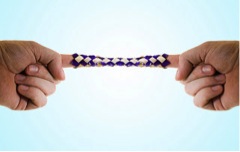Let’s start with the obvious. In most cases, human beings want to minimize pain and discomfort. This is doubly true for emotional pain. While some people enjoy extreme temperatures, endurance sports, and pushing their body to its limits, it’s very rare that anyone enjoys anxiety, panic, or depression. Unfortunately, the inner experiences we want to escape—our thoughts, feelings, and bodily sensations—are often the hardest to get away from.
Acceptance
People talk a lot about “acceptance,” but what does it really mean? I practice a form of treatment called Acceptance and Commitment Therapy; in practice, though, I don’t use the term acceptance much because the word is easily misunderstood. For this post, I won’t bother trying to give a definition of acceptance. Instead, I’d like to explain a metaphor I commonly use with the people I work with.

Introducing the Chinese finger trap
When I was a child, my pediatrician had a drawer of cheap toys I could choose from at the end of my appointments. Almost invariably, I chose a Chinese finger trap. If you’ve never seen one, finger traps are woven bamboo tubes (check out the picture above). You place your index fingers in either end, and when you try to pull them out, the tube constricts, trapping your fingers. When you push your fingers inward, it causes them to loosen.
I don’t just talk about this metaphor. I reach into a nearby box and pull out a few finger traps. I sit with the individual across from me, and we alternate between pulling and away and pushing our index fingers into the finger traps in effort to highlight the contrast. At the end of the session, I give them the finger trap to take with them, to serve as a reminder to check-in with their own experience between sessions—what happens when they struggle against pain?
Struggling with pain is like trying to get out of a Chinese finger trap
When we try to get away from emotional hurt or from bodily pain, the pain may tighten up on us, like the woven bamboo finger traps. Sometimes the struggle to change what we are feeling can make things worse, not better. Our life narrows down to a focus on what’s painful. We tell stories about it, and worry about it, and justify it, and explain it, and all we get for our troubles is more, not less, pain. But when we lean into our discomfort, as when we gently press our index fingers into the finger trap, we create some space.
Here’s a thought experiment: think about an uncomfortable experience. It could be a physical illness, a break-up, work stress, anxiety, depression—whatever. Now imagine someone told you that the pain would be gone in 5 minutes—would that allow you to experience that pain with less struggle? For most people, the answer is, “yes.” There’s very little we cannot experience in the moment, when we sit and really experience it as it is in the present. It is our attempts to struggle against the pain and our stories about it that amplify the pain.
This is the message I want to impart: “Leaning into discomfort doesn’t free you—you’re still in the trap—but you gain some wiggle room. A desire to pull away is natural—it tends to be our default—but it often gets us stuck.”
When we accept, we let go of the struggle against what we’re feeling—in this very moment. In the next moment, we get a choice about what to do next. Acceptance frees us from the struggle with pain and allows for new possibilities. When your entire focus is getting away from pain, this leaves few alternatives. If you’re willing to accept pain—even for a single moment—you’ve expanded your options.
Anxiety Treatment at Portland Psychotherapy
Author: Brian Thompson Ph.D.
Brian is a licensed psychologist and Director of the Portland Psychotherapy Anxiety Clinic. His specialties include generalized anxiety, OCD, hair pulling, and skin picking.


